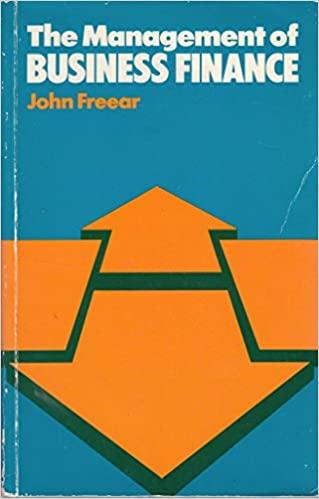Answered step by step
Verified Expert Solution
Question
1 Approved Answer
solve question 1 The budgeted activity and costs for the industrial equipment for the first 3 quarters are shown below: Additional information on the above


solve question 1
The budgeted activity and costs for the industrial equipment for the first 3 quarters are shown below: Additional information on the above quarterly cost budqets: a) Factory overheads include 14,000 per quarter for depreciation of factory machinery. b) The variable elements of production costs vary with production volume; all other costs with a variable element vary with sales volume. Relevant information for quarter 4 : a) In Quarter 4 the sales volume could range from an extreme low volume of 15,000 units to an extreme high volume of 21,000 units but with a most likely volume of 18,000 units. In the last month of Quarter 3 it would be possible to estimate accurately sales for Quarter 4. Management's instructions are to set the production level equal to the sales volume in Quarter 4. b) Costs in Quarter 4 are expected to differ from those in Quarters 1 to 3 as follows: 1) Material A will rise in price by 20%. 2) All production labour wage rates will rise by 12.5% 3) All fixed costs (except administration costs) will increase by 20%. For all 4 quarters: a) Assume inventory in all 4 quarters of will be valued at a standard cost of 30 per unit for inventory valuation purposes. Selling price will also remain the same for the year at 40 per unit. b) All sales are on credit. 70% these are expected to be received in 2 months and the remaining in 3 months. c) All production related cash expenses are paid in the month production takes place. All other expenses are paid in the month of the sales. Required (with workings where relevant): Question1: Explain, distinguish and classify all the above costs into: variable costs, fixed costs, semi-variable cost and semi-fixed costs. Distinguish between production costs and period costs using examples from above. Question2: Produce a statement which analyses, under each cost classification given in the budgets, the variable per unit and fixed costs which are expected to apply during Quarter 4. Question3: Prepare a flexible budget of estimated production costs for Quarter 4 for the 3 levels of output: 15,000 units, 18,000 units and 21,000 units considering all relevant information provided above. Question4: Prepare statements for Quarter 4 to show the budgeted profit and cash flow for the 3 levels of output: 15,000 units, 18,000 units and 21,000 units. Question5: Comment on why the 2 statements in (d) differ. The budgeted activity and costs for the industrial equipment for the first 3 quarters are shown below: Additional information on the above quarterly cost budqets: a) Factory overheads include 14,000 per quarter for depreciation of factory machinery. b) The variable elements of production costs vary with production volume; all other costs with a variable element vary with sales volume. Relevant information for quarter 4 : a) In Quarter 4 the sales volume could range from an extreme low volume of 15,000 units to an extreme high volume of 21,000 units but with a most likely volume of 18,000 units. In the last month of Quarter 3 it would be possible to estimate accurately sales for Quarter 4. Management's instructions are to set the production level equal to the sales volume in Quarter 4. b) Costs in Quarter 4 are expected to differ from those in Quarters 1 to 3 as follows: 1) Material A will rise in price by 20%. 2) All production labour wage rates will rise by 12.5% 3) All fixed costs (except administration costs) will increase by 20%. For all 4 quarters: a) Assume inventory in all 4 quarters of will be valued at a standard cost of 30 per unit for inventory valuation purposes. Selling price will also remain the same for the year at 40 per unit. b) All sales are on credit. 70% these are expected to be received in 2 months and the remaining in 3 months. c) All production related cash expenses are paid in the month production takes place. All other expenses are paid in the month of the sales. Required (with workings where relevant): Question1: Explain, distinguish and classify all the above costs into: variable costs, fixed costs, semi-variable cost and semi-fixed costs. Distinguish between production costs and period costs using examples from above. Question2: Produce a statement which analyses, under each cost classification given in the budgets, the variable per unit and fixed costs which are expected to apply during Quarter 4. Question3: Prepare a flexible budget of estimated production costs for Quarter 4 for the 3 levels of output: 15,000 units, 18,000 units and 21,000 units considering all relevant information provided above. Question4: Prepare statements for Quarter 4 to show the budgeted profit and cash flow for the 3 levels of output: 15,000 units, 18,000 units and 21,000 units. Question5: Comment on why the 2 statements in (d) differStep by Step Solution
There are 3 Steps involved in it
Step: 1

Get Instant Access to Expert-Tailored Solutions
See step-by-step solutions with expert insights and AI powered tools for academic success
Step: 2

Step: 3

Ace Your Homework with AI
Get the answers you need in no time with our AI-driven, step-by-step assistance
Get Started


